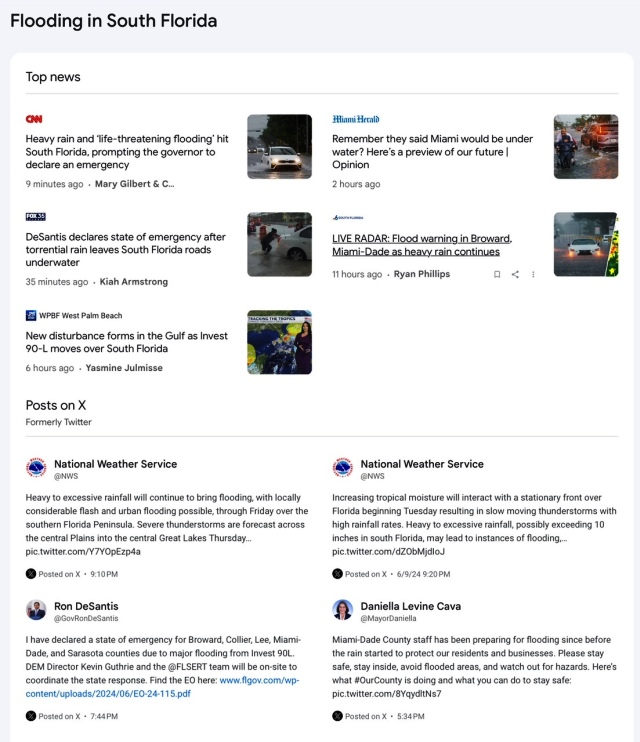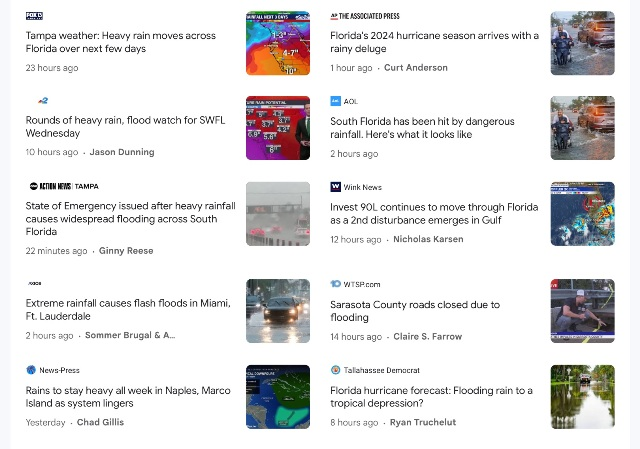File:Florida and climate change denial.png: Difference between revisions
Siterunner (talk | contribs) No edit summary |
Siterunner (talk | contribs) No edit summary |
||
| (One intermediate revision by the same user not shown) | |||
| Line 1: | Line 1: | ||
'''Miami and Climate Unreality''' | |||
* https://www.theatlantic.com/science/archive/2024/06/miami-climate-change-floods/678718/ | |||
June 18, 2024 | |||
''“Rain bombs” ... are products of our hotter world; warmer air has more room between its molecules for moisture. That water is coming for greater Miami and the 6 million people who live here. This glittering city was built on a drained swamp and sits atop porous limestone; as the sea keeps rising, the National Oceanic and Atmospheric Administration forecasts that South Florida could see almost 11 extra inches of ocean by 2040. Sunny-day flooding, when high tides gurgle up and soak low-lying ground, has increased 400 percent since 1998, with a significant increase after 2006; a major hurricane strike with a significant storm surge could displace up to 1 million people. And with every passing year, the region’s infrastructure seems more ill-equipped to deal with these dangers, despite billions of dollars spent on adaptation.'' | |||
Latest revision as of 00:47, 19 June 2024
Miami and Climate Unreality
June 18, 2024
“Rain bombs” ... are products of our hotter world; warmer air has more room between its molecules for moisture. That water is coming for greater Miami and the 6 million people who live here. This glittering city was built on a drained swamp and sits atop porous limestone; as the sea keeps rising, the National Oceanic and Atmospheric Administration forecasts that South Florida could see almost 11 extra inches of ocean by 2040. Sunny-day flooding, when high tides gurgle up and soak low-lying ground, has increased 400 percent since 1998, with a significant increase after 2006; a major hurricane strike with a significant storm surge could displace up to 1 million people. And with every passing year, the region’s infrastructure seems more ill-equipped to deal with these dangers, despite billions of dollars spent on adaptation.
Florida Gov. DeSantis signs bill that deletes climate change from state law
Florida Gov. Ron DeSantis this week signed legislation that erases most references to climate change from state law. The new law takes effect July 1.
NPR: Florida is about 74% reliant on natural gas to power electric generation, according to the U.S. Energy Information Administration. Opponents of the bill DeSantis signed say it removes the word "climate' in nine different places, moves the state's energy goals away from efficiency and the reduction of greenhouse gases blamed for a warming planet.
(Interview Transcript / Excerpt)
STEVE INSKEEP: Florida did have goals to enhance renewable energy use. What happens to those goals now?
AMY GREEN: This law nullifies those goals, which were aimed at moving the state toward 100% clean energy by 2050, and that's a benchmark scientists say is necessary to avoid the worst consequences of climate change. Keep in mind that here in Florida, the primary energy source is natural gas. The renewable energy goals were implemented in 2022 after some 200 young Floridians, all under the age of 25, filed a petition for rulemaking calling for them. I talked with one of those young Floridians, Delaney Reynolds. She described the new policy as, in her words, despicable and actually infuriating to read about and follow.
INSKEEP: Although clearly, the Republican-led legislature in Florida had a different view.
GREEN: That's right. This law is also right in line with Governor Ron DeSantis' rhetoric on these issues. As governor, he's described himself as, quote, "not a global warming person," and he's focused the state's climate policy on the Resilient Florida Program, which his administration characterizes as a historic investment to prepare communities for rising seas, more intense storms and flooding, and that program is aimed at hardening the infrastructure here. As a former presidential candidate, he said he would expand American dominance in oil and gas, and went so far as to promise he would replace the words climate change with energy dominance in national security and foreign policy guidance, and you see that reflected in this state legislation.
INSKEEP: Does the legislation match with what Floridians want?
GREEN: Not really. A new survey out this week from Florida Atlantic University shows that 90% of Floridians think that climate change is happening, and that's compared with 72% of all Americans who believe the same.
More
DeSantis on May 15 signed the energy bill, HB 1645, which House Speaker Paul Renner pushed. Renner said the bill was needed to support utilities against pressure from “unrealistic” climate goals.
The bill struck language in state law that said the goal of Florida’s energy policy is to “recognize and address the potential of global climate change wherever possible.” It was replaced with language directing the state to “promote the cost-effective development and ... use of a diverse supply of domestic energy resources.”
- https://www.msn.com/en-us/news/us/desantis-rejects-climate-change-rationale-for-record-breaking-rain/ar-BB1ogM9L
- https://www.cnn.com/2024/05/15/politics/desantis-bill-climate-change-florida/index.html
- https://www.independent.co.uk/news/world/americas/us-politics/desantis-climate-change-bill-florida-b2546117.html
- https://www.wlrn.org/the-florida-roundup/2024-06-10/florida-tv-meteorologists-climate-change-forecasts
- https://en.wikipedia.org/wiki/Climate_change_in_Florida
(May 2024)
DeSantis Signs Law Deleting Climate Change From Florida Policy
The law also stops programs designed to encourage renewable energy and conservation in a state that is highly vulnerable to the impacts of climate change
The new law, which passed the Florida Legislature in March and takes effect on July 1, will also prohibit the construction of offshore wind turbines in state waters and will repeal state grant programs that encourage energy conservation and renewable energy.
The legislation also deletes requirements that state agencies use climate-friendly products and purchase fuel-efficient vehicles. And it prevents any municipality from restricting the type of fuel that can be used in an appliance, such as a gas stove.
The legislation, along with two other bills Mr. DeSantis signed on Wednesday, “will keep windmills off our beaches, gas in our tanks, and China out of our state,” the governor wrote on the social media platform X. “We’re restoring sanity in our approach to energy and rejecting the agenda of the radical green zealots.”
Florida is one of the states most vulnerable to the costly and deadly impacts of climate change, which is largely driven by the burning of oil, gas and coal. Multiple scientific studies have shown that the increase of heat-trapping greenhouse gases in the atmosphere has contributed to sea level rise and more flooding in the state’s coastal cities.
Last year was the hottest in Florida since 1895, and the waters off its coast heated to 90 degrees during the summer, bleaching corals and scorching marine life. Hurricane Idalia made landfall on Aug. 30 near Keaton Beach and caused an estimated $3.6 billion in damages. The year before, Hurricane Ian was blamed for more than 140 deaths and $109.5 billion in damages in Florida, becoming the costliest hurricane in state history, according to the National Oceanic and Atmospheric Administration.
Florida’s coastal cities, like Fort Lauderdale, are increasingly vulnerable to flooding
(June 12-13, 2024
Floodwaters Deluge South Florida: Tropical Storm Produces Historic Flooding
- Increasing Sea-Level Rise, Near Ocean Infrastructure, Underground Salt Water Inundation, Lack of Planning Act to Send a Message
- Florida's Governor Again Responds with Political Statements Denying Climate Change
'Like A Zombie Movie'
Associated Press / National news reports from Miami, Florida
The streets of Miami were littered with abandoned vehicles that stalled out or got stuck in the floodwaters.
“Looked like the beginning of a zombie movie,” Ted Rico, a tow truck driver who spent much of Wednesday night and Thursday morning helping to clear the vehicles, told The Associated Press “There’s cars littered everywhere, on top of sidewalks, in the median, in the middle of the street, no lights on. Just craziness, you know. Abandoned cars everywhere.”
More:
(NYT) Faced with growing losses from floods and increasingly extreme weather, major insurers are pulling out of the state. Florida homeowners are scrambling to find coverage and, when they do, are paying some of the highest insurance premiums in the country. Thousands have enrolled in the state’s high-risk insurance pool of last resort, a fund that Mr. DeSantis has said is “insolvent.” Instability in the insurance market threatens Florida real estate and, by extension, the state’s economy, experts say.
The governor has supported programs to make communities more resilient to extreme weather.
But Mr. DeSantis, who suspended his bid for the Republican presidential nomination in January, has attacked climate policies as part of a push in the broader partisan culture wars. In a presidential debate last fall, Mr. DeSantis promised that “on Day 1, I’m taking all the Biden regulations, the Green New Deal, ripping it up and throwing it in the trash can where it belongs.”
~
File history
Click on a date/time to view the file as it appeared at that time.
| Date/Time | Thumbnail | Dimensions | User | Comment | |
|---|---|---|---|---|---|
| current | 13:44, 14 June 2024 | 640 × 192 (46 KB) | Siterunner (talk | contribs) |
You cannot overwrite this file.
File usage
The following 2 pages use this file:
- Sea-Level Rise & Mitigation
- Climate Change
- Climate Policy
- Caribbean
- Florida
- US
- Anthropocene
- Aquifers
- Atmospheric Science
- Building Standards
- Divestment from Fossil Fuels
- Earth
- Earth360
- Earth Imaging
- Earth Observations
- Earth Science
- Earth Science from Space
- Eco-nomics
- Ecology Studies
- Environmental Full-cost Accounting
- Environmental Protection
- Environmental Security
- Environmental Security, National Security
- Global Warming
- Green Best Practices
- Green Graphics
- Green Politics
- Land Use
- Maps
- NASA
- New Definitions of National Security
- NOAA
- Ocean Ecosystem
- Oceans
- Ocean Science
- Planet Citizens
- Planet Scientist
- Planet Citizens, Planet Scientists
- Renewable Energy
- Resilience
- Sea-level Rise
- Solar Energy
- Strategic Demands
- Sustainability
- Sustainability Policies
- Threat Multiplier
- US Environmental Protection Agency
- Water
- Water Pollution
- Wetlands
- Whole Earth

